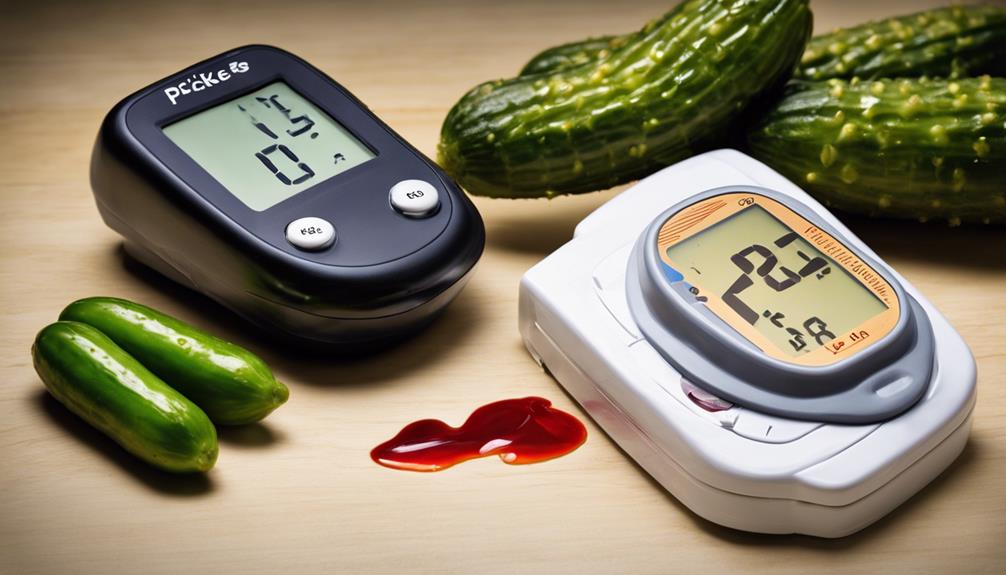Have you ever questioned whether pickles are a beneficial addition to a diabetic-friendly diet?
The debate surrounding the impact of pickles on blood sugar levels can be intriguing. While some argue that the low carbohydrate content and potential blood sugar-lowering effects of vinegar in pickles could be advantageous for individuals with diabetes, others raise concerns about the sodium content.
Let's explore how pickles can fit into a balanced diet for diabetes management and uncover the potential benefits and drawbacks they may offer to those seeking to control their blood sugar levels effectively.
Key Takeaways
- Opt for dill pickles over sweet for better blood sugar management.
- Watch sodium intake to avoid blood pressure and sugar spikes.
- Incorporate probiotic-rich pickles for improved gut health.
- Balance pickle consumption with nutrient-dense foods for overall health.
Nutritional Value of Pickles for Diabetes
Examining the nutritional value of pickles for diabetes reveals important considerations for individuals managing their condition through diet. Pickles, particularly dill pickles, offer a low-carb option with less than 2g of carbs and 1.1g of sugar in a 100g serving. This makes them a favorable choice for individuals looking to control their blood sugar levels. The vinegar present in dill pickles may also aid in lowering blood A1C levels, which is beneficial for those with diabetes.
However, sweet pickles contain significantly more sugar, around 18.3g, and should be consumed in moderation by individuals managing diabetes.
While pickles are low in calories, they lack essential vitamins and minerals, so they should be enjoyed as part of a balanced diet for diabetics. It's crucial to practice moderation when consuming pickles due to their high sodium content, which can impact blood pressure and overall health in individuals with diabetes. Balancing the nutritional benefits of pickles with their sodium content is key to incorporating them healthily into a diabetes management plan.
Impact of Pickles on Blood Sugar

The impact of pickles on blood sugar levels varies depending on the type consumed. Dill pickles are a favorable choice for individuals managing diabetes due to their low carbohydrate content. Dill pickles contain less than 2g of carbs in a 100g serving, making them a suitable low-carb option for diabetics. Moreover, the vinegar present in dill pickles may aid in lowering blood A1C levels, which is beneficial for diabetes management.
On the other hand, sweet pickles have around 18.3g of sugar in a 100g serving, potentially leading to blood sugar spikes for individuals with diabetes. Considering that pickles are low in calories and don't provide essential vitamins and minerals, they should be consumed in moderation.
For diabetics looking to include pickles in their diet, opting for dill pickles over sweet pickles is recommended due to their lower sugar content and more favorable impact on blood sugar levels.
Probiotic Benefits for Diabetics
Exploring the benefits of probiotics in pickles for individuals managing diabetes reveals potential improvements in gut health and insulin sensitivity. Probiotics found in pickles can positively impact the balance of gut bacteria, supporting better digestion and absorption of essential nutrients. For diabetics, this is particularly significant as healthy gut bacteria from probiotics may enhance insulin sensitivity, potentially aiding in blood sugar regulation. By incorporating probiotic-rich foods like pickles into their diet, individuals with diabetes can promote a balanced microbiome, which is essential for overall well-being and health management. Ensuring a diverse and healthy gut microbiota through probiotics not only supports digestion but also contributes to better insulin function and metabolic health. Below is a table summarizing the key benefits of probiotics in pickles for diabetics:
| Benefits | Description |
|---|---|
| Improved Gut Health | Enhances digestion and nutrient absorption. |
| Enhanced Insulin Sensitivity | May help regulate blood sugar levels. |
| Balanced Microbiome | Supports overall well-being and metabolic health. |
Antioxidants and Vitamins in Pickles

What essential antioxidants and vitamins are present in pickles that contribute to overall health and well-being?
Pickles contain antioxidants, such as vitamin C, which play a crucial role in boosting the immune system and fighting off infections. The fermentation process involved in making pickles can enhance the bioavailability of nutrients like vitamin K, aiding in various bodily functions. These antioxidants found in pickles also help in reducing oxidative stress in the body, which can have a positive impact on overall health.
Moreover, the vitamin C present in pickles supports collagen production, essential for maintaining skin health and elasticity. Pickles can serve as a good source of vitamins and minerals due to the pickling process, offering a range of essential nutrients to support overall well-being. By incorporating pickles into your diet, you can benefit from these antioxidants and vitamins, promoting a healthier lifestyle and improved immune function.
Side Effects and Considerations for Diabetes
Considering the potential impact on blood sugar levels, individuals with diabetes should be cautious about the type and quantity of pickles they consume. Pickles are generally low in calories and can be a flavorful addition to a diabetes meal plan. However, factors like sodium content, especially in dill pickles, can lead to high blood pressure and a spike in blood glucose levels. It's essential for those managing diabetes to be mindful of their sodium intake, as excessive salt can result in complications.
| Consideration | Effect on Diabetes |
|---|---|
| High Sodium Content | May lead to high blood pressure and blood sugar spikes. |
| Sweet Pickles | Added sugars can adversely affect blood sugar levels. |
| Moderation | Proper consumption spacing can reduce risks to blood sugar. |
| Monitoring | Consult with a healthcare provider for advanced diabetes management. |
| Weight Management | Careful management of pickles can aid in weight loss goals. |
Careful selection and moderation in pickle consumption can help individuals with diabetes enjoy this tangy treat while maintaining stable blood glucose levels and overall health.
Frequently Asked Questions
Can Diabetics Eat Lemon Pickle?
Yes, diabetics can eat lemon pickle in moderation. Its low carbohydrate content and high acidity may help manage blood sugar levels. However, caution is needed due to the salt content, which can be harmful in excess.
Homemade lemon pickle allows control over ingredients for a diabetic-friendly option. Consulting a healthcare provider or dietitian before adding lemon pickle to your meal plan is advisable for personalized guidance.
Do Pickles Raise Blood Pressure?
Pickles can indeed raise blood pressure due to their high sodium content. Excessive sodium intake from pickles may contribute to hypertension, leading to elevated blood pressure levels.
It's crucial for individuals, especially those with high blood pressure, to monitor their pickle consumption. Limiting the intake of pickles can help in maintaining healthy blood pressure levels.
Is Vinegar Good for Diabetics?
Yes, vinegar is beneficial for diabetics. Research shows that vinegar can improve insulin sensitivity, lower blood sugar levels, and reduce post-meal spikes.
The acetic acid in vinegar slows carbohydrate digestion, aiding in blood sugar control. Additionally, vinegar increases feelings of fullness and can assist in weight management.
Including vinegar in salad dressings or marinades is an easy way to harness its potential benefits for diabetes.
How Many Pickles Can I Eat per Day?
We can enjoy 1-2 dill pickles daily, but it's crucial to monitor sodium intake, especially for those with diabetes. Checking labels for sodium content and opting for lower-sodium pickles can help manage our consumption.
Consulting healthcare providers or dietitians for personalized advice is wise. Remember, moderation is key in balancing our diet and health needs.
Let's be mindful of our pickle portions to support our well-being.
Conclusion
In conclusion, pickles can be a good addition to a diabetic diet when consumed in moderation.
Did you know that pickles contain antioxidants that may help protect against cell damage and support overall health?
Remember to choose lower-sodium and no-sugar-added varieties to minimize potential risks.
It's always important to consult with a healthcare provider for personalized dietary recommendations to manage diabetes effectively.










